Marion Post Wolcott (1910–1990) was an American photographer who worked for the Farm Security Administration during the Great Depression documenting poverty, the Jim Crow South, and deprivation.
Post’s photographs for the FSA often explore the political aspects of poverty and deprivation. They also often find humor in the situations she encountered.
In 1941, Post met Leon Oliver Wolcott, deputy director of war relations for the U. S. Department of Agriculture under Franklin Roosevelt. They married, and Marion Post Wolcott continued her assignments for the FSA, but resigned shortly thereafter in February 1942. Wolcott found it difficult to fit in her photography around raising a family and a great deal of traveling and living overseas.
In the 1970s, a renewed interest in Post Wolcott’s images among scholars rekindled her own interest in photography. In 1978, she mounted her first solo exhibition in California, and by the 1980s the Smithsonian and the Metropolitan Museum of Art began to collect her photographs.
Post Wolcott’s work is archived at the Library of Congress and the Center for Creative Photography at the University of Arizona in Tucson, Arizona. These amazing vintage photos are part of her work that Marion Post Wolcott documented everyday life of the U.S during WWII.
 |
| Cooperative gas station at Greenbelt, Maryland, September 1938 |
 |
| A FSA (Farm Security Administration) borrower building a new gate for his yard, Prairie Farms, Montgomery, Alabama, 1939 |
 |
| A rainy evening in New York City looking west toward Hudson River from University Place, September 1939 |
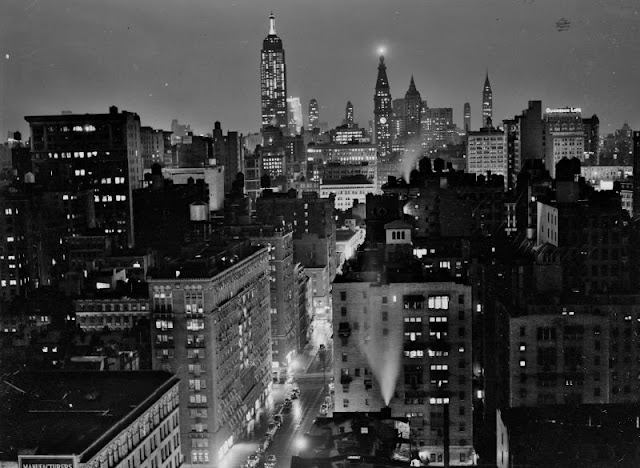 |
| A rainy evening in New York City, looking north from University Place, September 1939 |
 |
| Beach bathers at Miami Beach, Florida, 1939 |
 |
| Children on the steps of Mrs. Brown's home. FSA (Farm Security Administration) borrower on Prairie Farms, Montgomery, Alabama, 1939 |
 |
| Copper mining and sulfuric acid plant, Copperhill, Tennessee, September-October 1939 |
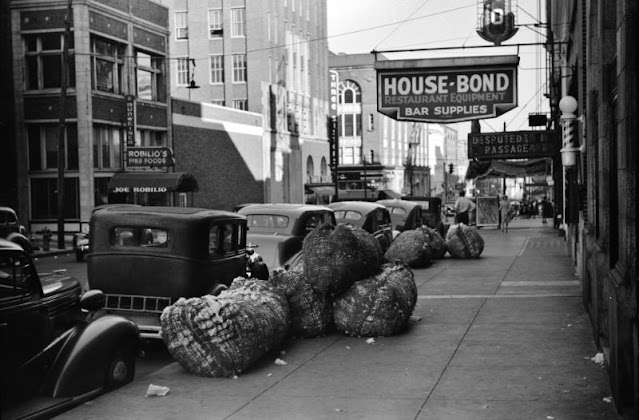 |
| Cotton snakes, waste cotton picked from floors of sampling and classing rooms in brokers' offices on Cotton Row, Front Street, Memphis, Tennessee, October 1939 |
 |
| Dade City tourist camp, Florida, 1939 |
 |
| Dade City tourist camp, Florida, February 1939 |
 |
| Domestic servants waiting for a streetcar on their way to work early in the morning, Mitchell Street, Atlanta, Georgia, 1939 |
 |
| Farmers playing cards on a winter morning, Woodstock, Vermont, 1939 |
 |
| General town meeting place the park, Lakeland, Florida, 1939 |
 |
| Home of one of two families who travel and work together all through the South, repairing stalls, stoves, tools, houses, and any other odd jobs. Tourist camp near Atlanta, Georgia, 1939 |
 |
| Horse races, Hialeah Park, Miami, Florida, 1939 |
 |
| Impoverished farmers sleeping in a white camp room in a warehouse. They often must remain several days before their tobacco is sold, Durham, North Carolina, 1939 |
 |
| In an old hotel building in Dover, Georgia, 1939 |
 |
| June in January, Miami Beach, Florida, 1939 |
 |
| Public health doctor giving a tenant family medicine for malaria, near Columbia, South Carolina, 1939 |
 |
| Sidewalk traffic on main street on the day of tobacco auctions in Mebane, North Carolina, November 1939 |
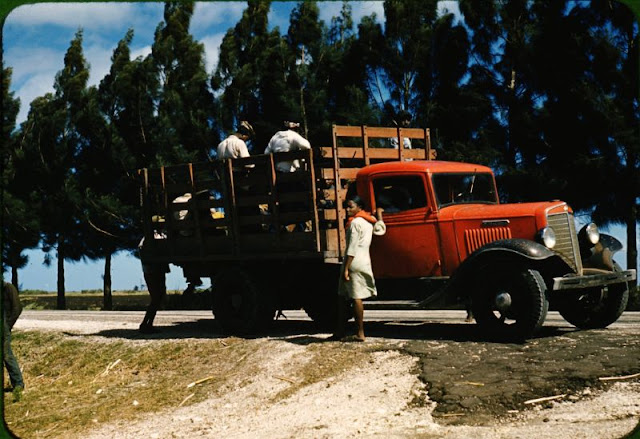 |
| Southern U.S., Mississippi, 1939 |
 |
| Spectators at the Duke University-North Carolina football game, Durham, North Carolina, October 1939 |
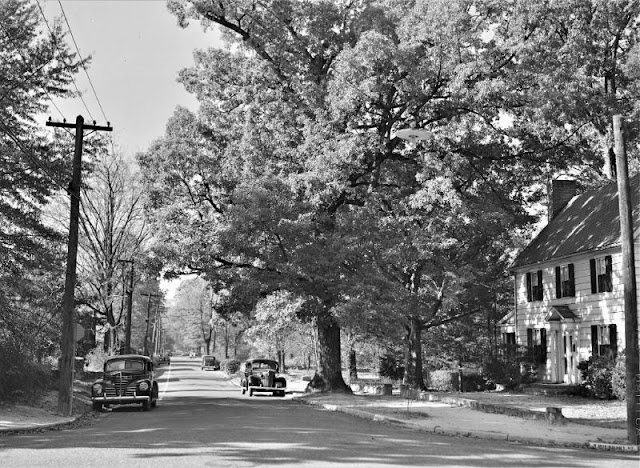 |
| Street in Chapel Hill, North Carolina, October 1939 |
 |
| Students during change of classes, University of North Carolina, Chapel Hill, North Carolina, September 1939 |
 |
| The horse races at Hialeah Park, Miami, Florida, 1939 |
 |
| The ski town of Woodstock, Vermont is generally very crowded with skiers on weekends, 1939 |
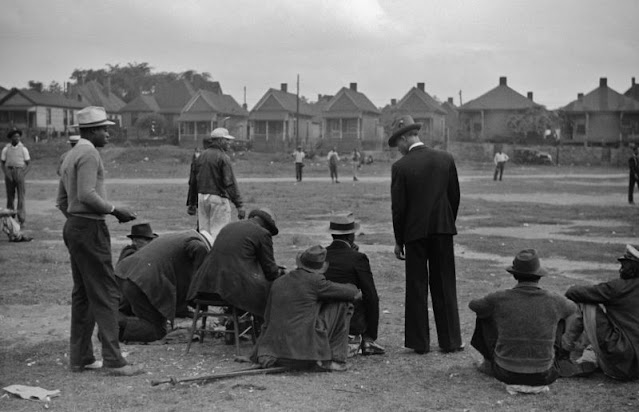 |
| Watching a baseball game, Atlanta, Georgia, 1939 |
 |
| A cross roads store, bar, juke joint, and gas station in the cotton plantation area, Melrose, Louisiana, June 1940 |
 |
| Farmer's co-op truck full of milk cans driving into town, Vermont, 1940 |
 |
| Farmers near Woodstock, Vermont bring their cans of milk to the crossroads early every morning where it is picked up by the coop farmers' truck and is taken to the city, 1940 |
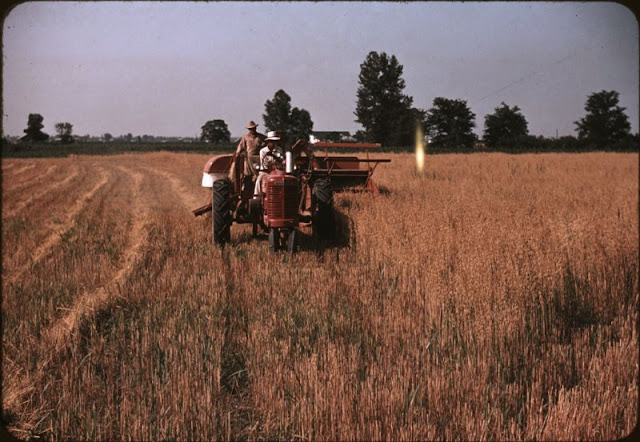 |
| Harvesting oats in southeastern Georgia, April 1940 |
 |
| Hired man on a farm near Woodstock, Vermont, usually empties the radiator in his car every evening and refills it again with water in the morning to save the cost of antifreeze, 1940 |
 |
| Horse and sled of a garbage and rubbish collector, Woodstock, Vermont, 1940 |
 |
| Lunchroom near Belle Glade, Florida, January 1939 |
 |
| Mailman making deliveries after a heavy snowfall, Woodstock, Vermont, 1940 |
 |
| Mailman making deliveries after a heavy snowfall, Woodstock, Vermont, 1940 |
 |
| Outside Natchez, Mississippi, August 1940 |
 |
| Port Gibson, Mississippi, August 1940 |
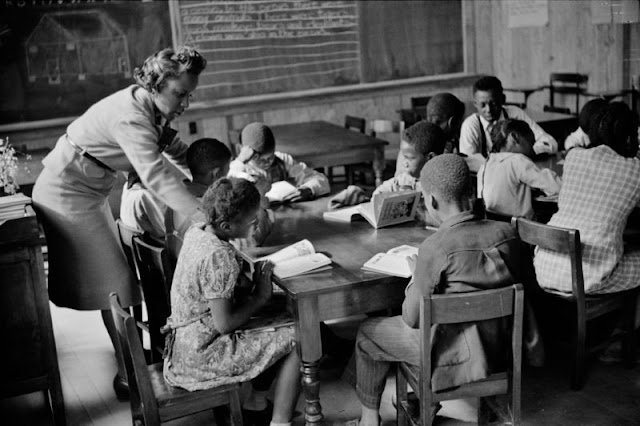 |
| Primary class in new school, Prairie Farms, Montgomery, Alabama, 1939 |
 |
| Residential section of North Conway, New Hampshire, February 1940 |

|
| Snowy night in the center of town in Woodstock, Vermont, 1940 |
 |
| Storefront with advertising signs in Natchez, Mississippi, August 1940 |
 |
| Street scene in Port Gibson, Mississippi, August 1940 |
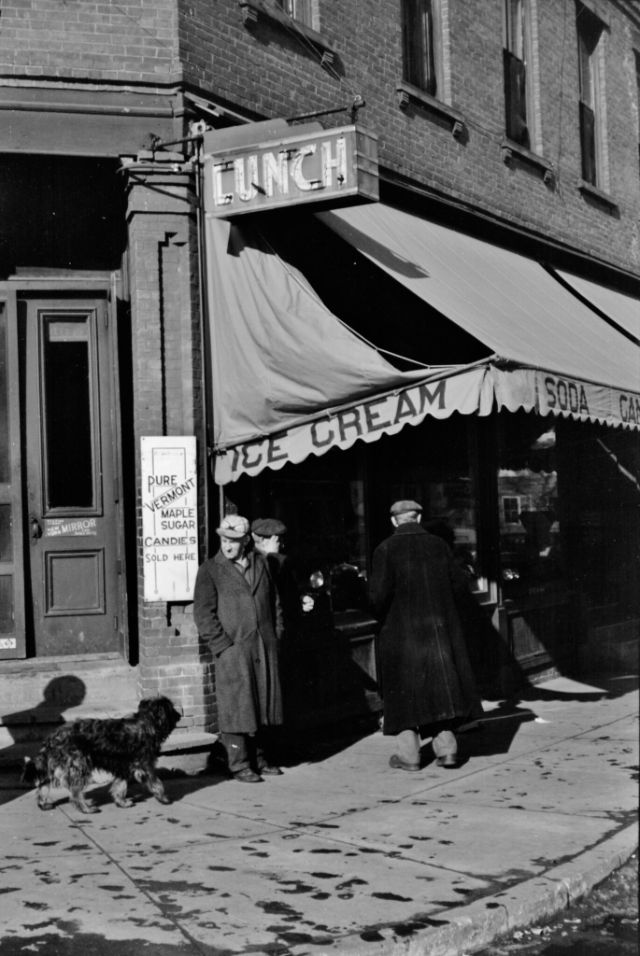 |
| Townspeople discussing the severe winter on the street corner in center of town in Woodstock, Vermont, 1940 |
 |
| Townspeople of Woodstock, Vermont, discussing the severe winter on the street corner in center of town, 1940 |
 |
| Townspeople of Woodstock, Vermont, discussing the severe winter on the street corner in center of town, 1940 |
 |
| Two men on a street in Woodstock, Vermont, 1940 |
 |
| Sunday afternoon in New Orleans, Louisiana, January 1941 |

|
| Sunday afternoon in New Orleans, Louisiana. Men playing checkers, January 1941 |

|
| Winter tourist reading a magazine beside his trailer home, Sarasota trailer park, Sarasota, Florida, January 1941 |